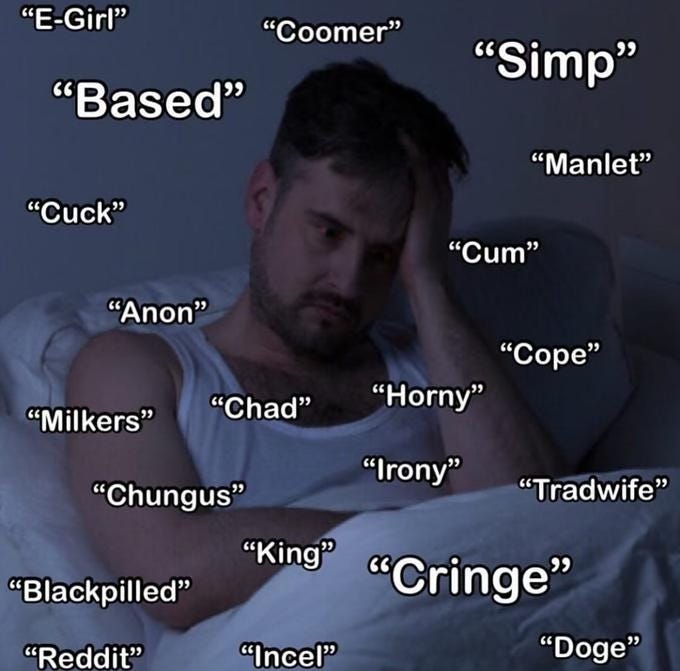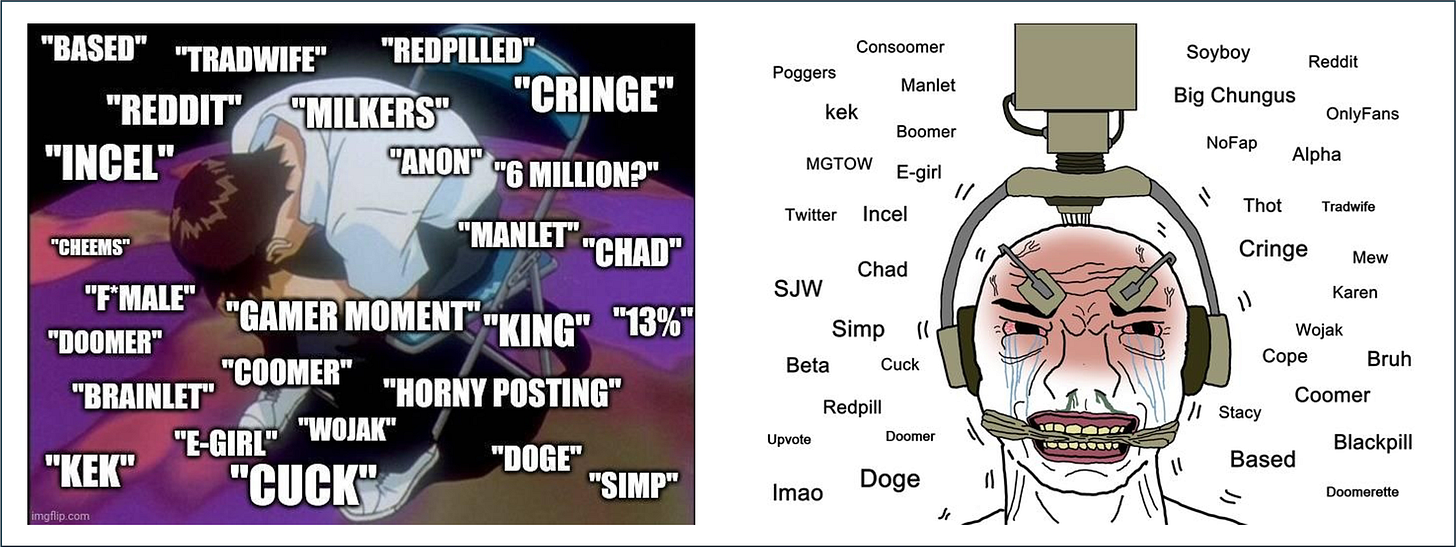There’s no question that 2024 was the year of “brainrot.”
The term—chosen as the Oxford University Press Word of the Year—has seemingly appeared everywhere online, describing both the idea of the “internet rotting our brains” and a meme aesthetic characterized by the nonsensical repetition of trending slang words.
While the first definition has been circulating online for decades, the origin of the aesthetic can be harder to pinpoint. Individual words like “skibidi” have been referred to as “brainrot” since at least August 2023, but the first time these words were combined into a single “brainrot meme” was probably the Rizzler song in October 2023:
Sticking out your gyat for the rizzler
You’re so skibidi
You’re so fanum tax
I just wanna be your sigma
Freaking come here
Give me your ohio
The importance of the Rizzler song cannot be overstated, because it pioneered the absurd attitude toward language that now dominates internet culture. Following the initial meme, we saw thousands of remixes of the song; spin-off phrases like “what the sigma”; and dedicated “brainrot creators” capitalizing on the trend through “cringe content.” You could say that the Rizzler song marked the beginning of the brainrot era.
However, there is an earlier contender.
Although the “brainrot” label had not yet been applied to them, a series of “slang overload” memes in early 2020 relied on the exact same notion of absurd linguistic oversaturation. This was mostly expressed through depictions of anguished men surrounded by internet slang words:

Certainly, the language now appears dated, but the joke bears all the hallmarks of contemporary brainrot. In it, internet language is so repeated that it loses meaning, becoming funny to the meme’s audience simply because it’s already funny.
At the same time, the slang overload memes depended on the words causing some kind of mental damage. We might not have called it “brainrot” at the time, but the idea that slang humorously hurts our brains was quite prescient of the eventual aesthetic.
As with contemporary brainrot, it’s not a coincidence that slang overload words looked like SEO metadata. Both jokes emerged in reaction to the increased influence and commercialization of social media.
Notwithstanding these genuine concerns, I find it quite interesting that these memes actually predate the emergence of “TikTok slang,”1 because they show how the reactionary attitude toward language isn’t inherent to the social media algorithms we currently blame for “rotting our brains.” Instead, the slang words all trace back to 4chan and other early internet forums. Some terms, like “lmao” and “cope,” now seem completely normal to us. Others, like “coomer” and “kek,” have been left in the past; even more, like “mew” and “pilled,” have gone on to be considered “brainrot.”
There’s no real difference between any of these words. They’ve all just followed normal slang life cycles. Sometimes new terms stick, sometimes they remain “slang,” and sometimes they’re forgotten.
This pre-algorithmic brainrot points to something I’ve been trying to communicate for a while: our concerns about “internet slang” are just standard generational griping about natural language change. Emergent technology may affect the medium of where that change happens (in this case, from 4chan to TikTok), but “brainrot” is what happens when we project our concerns about those mediums onto their language.
Eventually, of course, we’ll develop new technology. With it, we’ll get new words, new concerns, and new memes about those concerns. The “rizz” and “skibidi” jokes will seem as antiquated as the “doge” and “anon” jokes, and language will continue to march relentlessly into the future.
In other news, I recorded an hour-long podcast episode with Alex O’Connor from Within Reason. If you feel like watching, please check it out below!
I put this in quotes to caveat that most “TikTok slang” has previous origins, especially in African-American English.




I enjoy the new slang. Welcome it.
But I hate that the word "literally" is now used as an intensifier, which means that when you want to indicate that something really did happen, you no longer have a word that means literally. Perhaps "literally-literally"?
I was actually thinking about the origin of skibidi recently and i realized it started from the tv show The Boys and a Turkish creator "Yas Cengiz"
So Cengiz was making short videos shaking his belly and dancing using a Turkish song by Biser King, that Turkish song had a new remixed version, the video of the song featured a person looking similar to Karl Urban's character from the Boys, Billy Butcher. At the time the boys just released its third season and it was quite viral. I quite like show and it feels wild thinking about how all this went down 3 years ago.